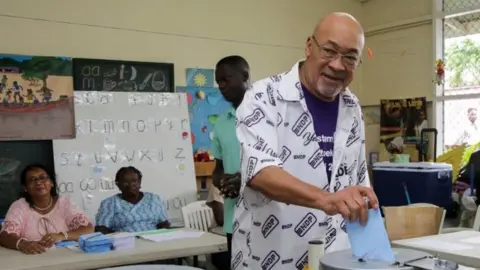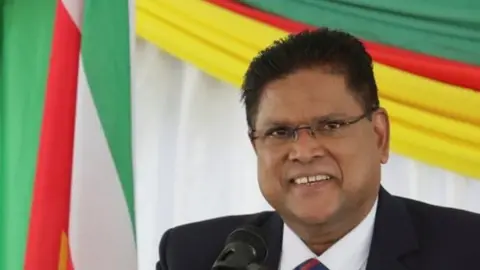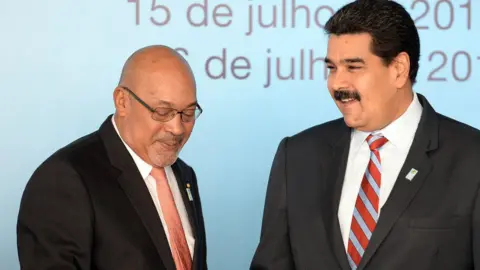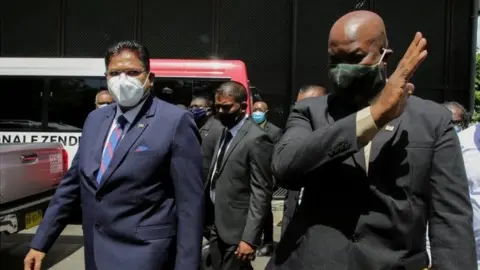Suriname election: Convicted murderer Dési Bouterse is replaced by ex-police chief
 Reuters
ReutersThe National Assembly of Suriname has elected Chan Santokhi as the South American country's new president.
The move comes after Mr Santokhi's party won the largest share of votes in legislative elections in May.
Mr Santokhi, a former police chief, will replace outgoing president Dési Bouterse, who was found guilty of murder in 2019.
The two men are bitter rivals as it was Mr Santokhi's investigation which led to Bouterse's conviction.
Bouterse is currently appealing against the verdict.
Who is Chan Santokhi?
Chandrikapersad "Chan" Santokhi, who is 61, leads the Progressive Reform Party.
 Reuters
ReutersBorn in Suriname, which is a former Dutch colony, he studied at the police academy in the Netherlands. After his return to Suriname, he became a police inspector and in 1991 was named chief of police.
From 2005 to 2010 he served as minister of justice. He ran for the presidency in 2010 but lost to Bouterse.
Bouterse was re-elected to a second term in 2015 and was confident of winning a third consecutive term in elections in May but it was Mr Santokhi's party which emerged victorious.
The Progressive Reform Party won 20 of the 51 seats in the National Assembly, enough to form a coalition government with the General Liberation and Development Party. The latter is led by Ronnie Brunswijk, who will serve as vice-president.
The end of Desi Bouterse's career?
Bouterse, 74, has long influenced politics in Suriname.
He first came to political prominence when he led 15 follow non-commissioned officers in overthrowing the government of Henck Arron, the first to lead Suriname following its independence from the Netherlands.

In his role as National Military Council chairman, he was Suriname's de facto leader for much of the 1980s.
It was during this time, in December 1982, that soldiers rounded up, tortured and executed 15 of Bouterse's opponents.
 Getty Images
Getty ImagesBouterse claims the victims, who included trade union leaders and journalists, were shot as they were trying to escape from the colonial-era fortress in which they were being held.
In 2007, he admitted "political responsibility" for what has become known as the "December murders" but he has always denied personal responsibility.
A trial started that same year and three judges concluded 12 years later, in November 2019, that Bouterse was guilty of murder and should serve 20 years in jail. However, no arrest warrant was issued.
The guilty verdict over the "December murders" is not his only conviction. In 1999, a court in the Netherlands found Bouterse guilty of smuggling more than a thousand pounds of cocaine and sentenced him in absentia to 11 years in prison.
Bouterse has always denied the drug-smuggling allegations.
What next?
Chan Santokhi will be sworn in as president on Thursday. Speaking after the National Assembly elected him, he said that he was inheriting a country "on the brink of financial collapse".
"We are balancing on the edge of an international default," he added while calling on the people of Suriname to stand "shoulder to shoulder" to tackle the challenges ahead.
He also said that "the government we form will pursue a coherent policy to work together towards that one goal: the recovery of Suriname".
In order to achieve a united front, Mr Santokhi will have to work with his vice-president, Ronnie Brunswijk.
 Reuters
ReutersAs a former rebel leader who fought a civil war against Bouterse, Ronnie Brunswijk would seem like a natural ally of Mr Santokhi.
But Ronnie Brunswijk has been known to switch allegiances in the past. Between 2010 and 2015, he put his differences with Bouterse to one side to join him in a coalition government.
Bouterse himself referred to the challenges ahead for Mr Santokhi when he said on Monday that "out of experience, I can tell you it won't be an easy job".
It is not clear yet if an arrest warrant will be issued for Bouterse once he ceases to be president on Thursday.
